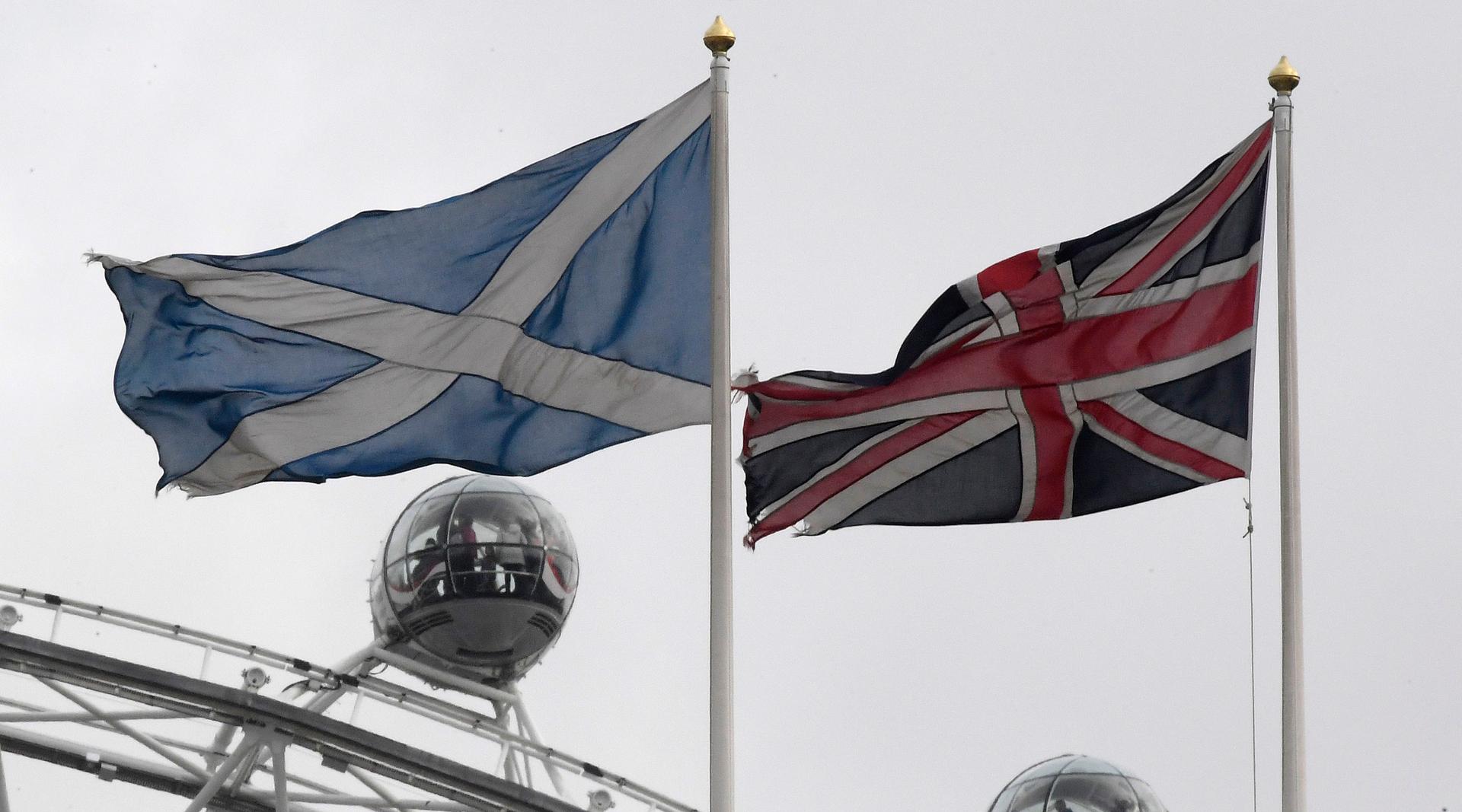Scotland’s leader wants another independence vote before Brexit
The British Union Flag, right, and a Scottish Saltire flag fly above the Scottish Office in Whitehall, with the London Eye wheel seen behind, in London.
A breakup upon a breakup? Scotland this week said it's planning to hold another independence referendum, and that's tripping up Prime Minister Theresa May, as she prepares to trigger Britain's own divorce from the European Union.
May could be forced into giving the go-ahead for the Scottish vote — but only after Brexit.
Scottish First Minister Nicola Sturgeon made the bombshell announcement on Monday that her administration would hold a new referendum to break away from the United Kingdom. It came at the start of a week in which May is expected to begin the process of extracting Britain from the EU.
Downing Street then played down talk of an imminent statement on starting Brexit, which it said had always been planned for later in the month — but British newspapers were left in no doubt as to what had happened.
"Sturgeon ambushes May," read a front-page headline in The Times, while The Guardian said: "May's Brexit plan upstaged as Sturgeon seizes her moment."
The Metro daily said: "Scots throw a sporran in the works" — a reference to a distinctive leather pouch worn in traditional Scottish Highland dress.
Commentators pointed out the awkward situation: Prime Minister May will now be forced to argue at the same time against membership of one union — the European one — but in favor of another — the British one.
The referendum call "weakens Theresa May's position because it could mean that if she pursues a hard Brexit that we end up with a constitutional crisis and possibly the break up of the United Kingdom itself," said John Springford, director of research at the Centre for European Reform think-tank.
"She won't want to be the prime minister who led to the UK no longer existing," Springford said.
The European Commission said an independence referendum was a domestic matter for Britain but indicated that Scotland would have to reapply to join the EU if it pulled out of the UK.
May faces another headache in Northern Ireland as she pushes ahead with what her critics have called "hard Brexit," departing from Europe's single market.
Irish nationalists Sinn Fein gained significant ground in elections earlier this month and on Monday called for a referendum "as soon as possible" on Northern Ireland leaving the UK and joining the Republic of Ireland.
'Completely unacceptable' timing
May has the power to block a Scottish referendum, but experts said she would be unwise to do so since this could push public opinion in favor of independence.
But she could object to Sturgeon's preferred timing of holding the vote by early 2019, before Britain actually leaves the European Union.
Sturgeon on Tuesday warned the British government that there should be no "blocking mechanisms" for her plans.
"It should be up to the Scottish parliament to determine the referendum's timing, franchise and the question," she said.
But Ruth Davidson, the leader of the Scottish Conservatives, said the timetable "would force people to vote blind" as they would not yet know the terms of the Brexit deal.
A government source was quoted as saying in The Times newspaper: "The prime minister has said this would mean a vote while she was negotiating Brexit and I think that can be taken pretty clearly as a message that this timing is completely unacceptable.
"It would be irresponsible to agree to it and we won't," the source said.
Significant chance of independence
Support for Scottish independence is at a record high, but still remains below 50 percent, according to opinion polls published on Wednesday.
A long-term social attitudes study by ScotCen Social Research found that 46 percent of Scots now back independence, the highest level since the survey began in 1999.
"Overwhelming support for independence among younger voters might mean there is majority support for independence in future," ScotCen said.
Scotland voted against independence by 55 percent to 45 percent in its 2014 referendum.
On Monday, May said a Scottish independence vote would be "divisive and cause huge economic uncertainty" and would come at the "worst possible time."
She is expected to give a more detailed answer next week after Sturgeon receives formal authorization from the semi-autonomous Scottish parliament to apply for permission from the British government.
Some 62 percent of voters in Scotland backed Britain staying in the EU in the June referendum. Across the whole UK, 52 percent voted in favor of Brexit.
Springford, of the Centre for European Reform, said, "I think there's quite a significant chance of Scottish independence this time."
By AFP's Dario Thuburn and Alice Ritchie in London.
We want to hear your feedback so we can keep improving our website, theworld.org. Please fill out this quick survey and let us know your thoughts (your answers will be anonymous). Thanks for your time!
